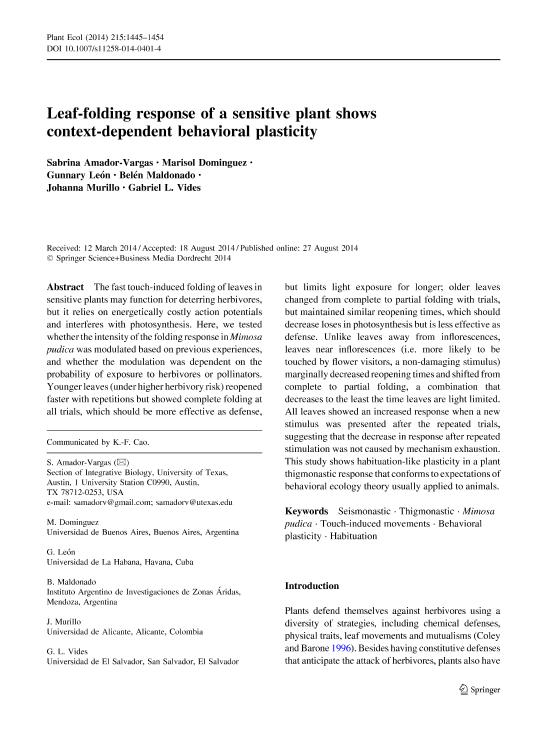Artículo
Leaf-folding response of a sensitive plant shows context-dependent behavioral plasticity
Amador Vargas, Sabrina; Dominguez, Marisol ; León, Gunnary; Maldonado, María Belén
; León, Gunnary; Maldonado, María Belén ; Murillo, Johanna; Vides, Gabriel L.
; Murillo, Johanna; Vides, Gabriel L.
 ; León, Gunnary; Maldonado, María Belén
; León, Gunnary; Maldonado, María Belén ; Murillo, Johanna; Vides, Gabriel L.
; Murillo, Johanna; Vides, Gabriel L.
Fecha de publicación:
08/2014
Editorial:
Springer
Revista:
Plant Ecology
ISSN:
1385-0237
e-ISSN:
1573-5052
Idioma:
Inglés
Tipo de recurso:
Artículo publicado
Clasificación temática:
Resumen
The fast touch-induced folding of leaves in sensitive plants may function for deterring herbivores, but it relies on energetically costly action potentials and interferes with photosynthesis. Here, we tested whether the intensity of the folding response in Mimosa pudica was modulated based on previous experiences, and whether the modulation was dependent on the probability of exposure to herbivores or pollinators. Younger leaves (under higher herbivory risk) reopened faster with repetitions but showed complete folding at all trials, which should be more effective as defense, but limits light exposure for longer; older leaves changed from complete to partial folding with trials, but maintained similar reopening times, which should decrease loses in photosynthesis but is less effective as defense. Unlike leaves away from inflorescences, leaves near inflorescences (i.e. more likely to be touched by flower visitors, a non-damaging stimulus) marginally decreased reopening times and shifted from complete to partial folding, a combination that decreases to the least the time leaves are light limited. All leaves showed an increased response when a new stimulus was presented after the repeated trials, suggesting that the decrease in response after repeated stimulation was not caused by mechanism exhaustion. This study shows habituation-like plasticity in a plant thigmonastic response that conforms to expectations of behavioral ecology theory usually applied to animals.
Palabras clave:
Seismonastic
,
Thigmonastic
,
Mimosa Pudica
,
Touch-Induced Movements
Archivos asociados
Licencia
Identificadores
Colecciones
Articulos(IEGEBA)
Articulos de INSTITUTO DE ECOLOGIA, GENETICA Y EVOLUCION DE BS. AS
Articulos de INSTITUTO DE ECOLOGIA, GENETICA Y EVOLUCION DE BS. AS
Citación
Amador Vargas, Sabrina; Dominguez, Marisol; León, Gunnary; Maldonado, María Belén; Murillo, Johanna; et al.; Leaf-folding response of a sensitive plant shows context-dependent behavioral plasticity; Springer; Plant Ecology; 215; 12; 8-2014; 1445-1454
Compartir
Altmétricas



